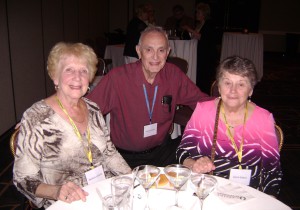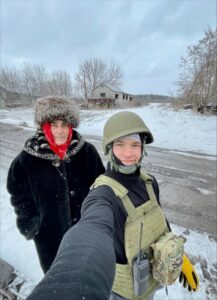 Joseph Beno of Branch 743 in Sterling Heights, Michigan, recommended that I talk with Marek Janiga, a humanitarian worker volunteering for the Slovak Catholic Charity (Caritas). Thus, we had a three-way conversation on March 24, 2023, which is summarized here.
Joseph Beno of Branch 743 in Sterling Heights, Michigan, recommended that I talk with Marek Janiga, a humanitarian worker volunteering for the Slovak Catholic Charity (Caritas). Thus, we had a three-way conversation on March 24, 2023, which is summarized here.
Although he lived in Michigan, Janiga was born in Veličná, Slovakia, a village in Orava, near Dolný Kubin. His mother is a university professor and his father formerly served as a mayor. He is 19 years-old and a student of law at the Comenius University in Bratislava. He also does work for the Department of State, Bureau of Educational and Cultural Affairs. 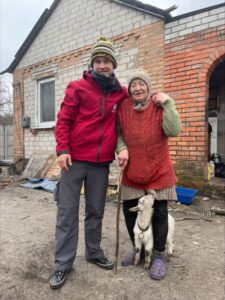
The Ukrainian war and its consequences for people motivated him and others to want to do something personally to relieve people’s suffering in Ukraine. After the Russians invaded Ukraine, he organized a benefit piano recital in the Saint Cyril and Methodius Slovak Catholic Church while living in Sterling Heights. Then his brother hooked him up with Caritas, Slovak Catholic Charities. So, Marek moved back to Slovakia and is currently busy helping the Ukrainians and doing some dangerous work at times. He has spent more than a month in Ukraine and has made six humanitarian trips to Ukraine to help. In fact, he left for a seventh trip taking supplies to Ukraine just a few days after our conversation. When he returns to Slovakia, he gives presentations, interviews, and writes articles about the situation in Ukraine.
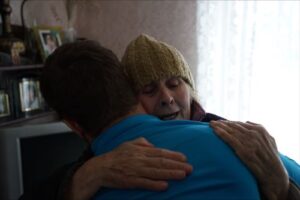
In our discussion, we asked what do people of Ukraine think about the outside help? He stated that a common misconception caused by misinformation concerns discrimination or even genocide of the Russian people in Donbass. About 80 percent of the people in Kharkiv speak Russian as their native language, and it is only 30 minutes from the Russian border. Some people in the city and many in the surrounding villages do not speak Ukrainian at all. He visited the second-largest city (1.5 million people before the war) on five occasions and saw destroyed neighborhoods and a non-functioning city. The Russians were in the city in the first days of the war. He was in the city already in July when the Russian army was only 15 kilometers from the city. The holes where bombs fell were visible. Until 2014, many people saw Russians as natural brothers, and hoped for cooperation, but all has changed, and now only very few people, mostly in their 80s are more pro-Russian and gave vague answers. Almost everyone wants the Russians to go away for good.
When he went to Kharkiv, nothing was functioning in the city and Russians were just15 minutes away. They helped a local charity, Caritas Spes-Kharkiv. Several vans arrived from Slovakia, and they united with other charitable volunteers. They needed to coordinate because of security. With a chain of cars of local volunteers, they brought mostly food and medications, baby products, blankets, and water to the northernmost district of Kharkiv called Saltivka that was under Russian shelling at the time. About 3,000 people lined up in a long line
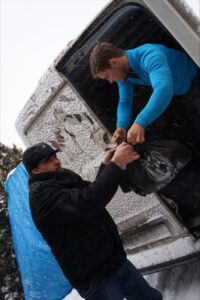
How many Slovaks are involved? He said that many people helping/collecting aid at home and dozens of Slovaks are driving with aid back and forth. It is a 20-hour drive to deliver the aid to eastern Ukraine, going through many military checkpoints. Since the beginning of the war, Slovak Catholic Charity has delivered 900 tons of humanitarian aid. In the beginning, they used to send trucks with 200,000 euros worth of supplies, but now they are short of money because popular support has been declining because of donor’s fatigue.
When asked if there is a story that describes best what is happening, he replied that the hardest thing is to see the children, who suffer and dream and hope for a brighter future. One particular child, 8-year-old Inha, used to go to Kharkiv for dance classes but had not been able to leave the house for months because of the Russian occupation. Her grandfather was hit by shrapnel from a rocket that fell around 3 meters from him while working. With wounds in his lungs, intestines, heart, arm, and leg, he had to crawl 300 meters to his house. When his wife had asked the occupying Russians for help, they refused to care for him, and locals drove him to the nearest Russian hospital where he was treated for his injuries and later moved through Finland and back to Poland and Ukraine.
Marek got as close as 3 km from the Russian lines. They were not targeted specifically, but a few days before our talk, they started shelling nearby, 6-700 meters away, and as close as 400 meters to him in Kharkiv. The windows and the walls were shaking.
If citizens in the USA wants to help sending material, what can they do? He suggested finding a person or an organization that you trust and can see the results of your contribution. Things often get lost if given to a non-verified person. Sending material aid from the US is not worth it because the prices are much lower there. Organizations like Caritas provide humanitarian aid, not military equipment, and all those materials can be bought in Europe.
He did relate that Ukraine still has problems with corruption and a black market, at a high level and at the local level. If given to a non-trusted person, it happens that the aid “gets lost” in someone’s cellar. The military is very strict about enforcement, security, and thefts in the conflict areas.
A network helps organize where help goes. In Kharkiv, three Polish priests help the Ukrainian Catholic Charity assist in telling where something in needed. He left again on the last Wednesday in March and would be gone 6-7 days, and when he returned, he planned on making yet another run to Ukraine. Such is his dedication and that of many other Slovaks.
If you wish to help, Slovak Catholic Charities is a safe choice as 95% of the funds collected go directly to those in need; Caritas keeps administrative costs at a minimum and uses volunteers. Here are links in English and Slovak to give donations:
English – https://charita.darujme.sk/help-ukraine/ Slovak – https://charita.darujme.sk/ukrajina/
Dr. Michael Kopanic, Jr., editor


